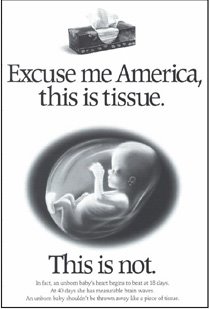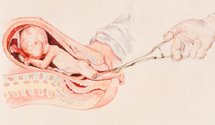A Woman’s Right to Choose: Fact or Fraud?

It has been reported that Confucius was once asked what he would do to set the world right. His reply was, "I would insist on the exact definition of words." What a wise response!
To conform to Confucius’ standard, and to adopt a phrase promoted by Dr. David Reardon of AfterAbortion.org, we will henceforth refer to abortion advocates as “poor-choicers,” rather than “pro-choicers.”
Let the average citizen examine with us the reasons for this.
“But women should have the freedom to choose.”
"Abortion is acceptable because a woman has a right to choose what is right for her and her baby."
"Who are you to say what choices I can and can’t make with my body?"
“It is a woman’s right to choose because women, not men, are the ones who have abortions.”
“Those who oppose a woman’s right to choose must be exposed for who they are… anti-choicers.”
These examples of rhetorical strategy have been very successful in convincing Canadians to believe that abortion is an undeniable right that accompanies a woman’s sexuality and the ownership of her own body. Furthermore, any call for a law banning abortion on moral grounds is considered extreme, restrictive and even a challenge to Canadian freedom.
In reality, these kinds of conclusions pose great dangers to our future, to our human rights and to our freedoms. The general public needs to be reminded that no individual has an unrestricted freedom or right to choose. Consider that the most basic moral premise behind government is to protect human life. The government’s duty to do so is neither subjective nor conditional. When our privacy and our choice bring harm to another individual, our laws quickly bring an end to our right to privacy and our right to choose. Is an innocent human being damaged by a woman's choice to have an abortion? If not, no problem. If so, it is a major problem which government has a moral duty to address.
All laws impose a moral viewpoint and restrict the individual's behavior, as illustrated by laws against murder, rape, child abuse and drunk driving. When the rights of fellow human beings, “significant others,” are at stake and particularly when their very lives are at stake, every just society restricts the individual's freedom of choice. The moral basis for our law is that our personal freedom must never deprive others of life, liberty, or property.
So let us return to the original poor-choice claim and finish the statement: Women should have the right to choose…….what? Poor-choicers would reply: “…the right to choose what is best for her and her baby.” This is a wonderful sounding statement but it craftily avoids the central reality of the choice. In its simplicity the slogan implies that there is no “significant other” in the equation. Its unsubstantiated assumption is that the Unborn is undeserving of such status and can be disregarded—even omitted from the conversation. The “right to choose” slogan muddies the waters and hides from view what’s really there. And presto! The issue is now switched from “Doesn’t abortion take the life of an innocent human being?” to “Can’t a woman choose?”
The tragic, but carefully crafted, result of this distortion is that the general public is unwittingly left to imagine that the Unborn in the womb, if anything, is somehow an entirely different class of being from you or me, and as long as no further discussion or details are forthcoming, the average citizen is too pre-occupied with their own affairs to inquire further.
To further illustrate the point, what would happen if pollsters asked, "Do you favor killing unborn children?" instead of "Do you believe a woman has a right to choose?" The polls would certainly report fewer poor-choicers. Again, how many would support “a woman’s choice or right to hire an abortionist to dismember the Unborn she carries in her womb?"
But poor-choicers know that by using the right words, and using them consistently, the majority of people quickly lose the mental connection between a woman’s “right to choose” and the death of a fellow human being. By consistently labeling themselves as “pro-choice” rather than “pro-abortion” they suggest their opposition (!!!) to abortion and their dedication to defending a woman’s right to choose (…to kill her unborn). But in the end, what's the difference? Pro-choice or pro-abortion, the result is the same—dead human beings.
Insisting on the exact, and consistent, definition of the word “pro-choice,” as Confucius indicated, reveals that many pro-lifers are actually and vigorously pro-choice, in the proper sense of the word. We support a woman’s right to choose her own health care provider, to choose her own job, to choose her own religion, and to choose her own career, to name a few. But just as importantly, we support a pregnant woman’s right to make informed choices about the true nature of abortion. She should know of the unrelenting heartache, clinical depression, substance abuse, marriage difficulties, increased risk of breast cancer, infertility, and future birth complications commonly linked to abortion. To help her make the best choice, she ought to also know basic facts about fetal development and fetal pain studies.
Poor-choicers object to helping women make these kinds of informed choices about their pregnancy, which disqualifies them from being truly pro-choice. Their zeal has little to do with choice or women’s heath. Since most women are pressured into abortions by other persons (especially by poor-choice “friends” and “professionals”) and circumstances, how could anyone describe it as a healthy choice which sets women free? The woman’s predicament seems to offer "no choice" but the poor choice of abortion.
A woman’s right to choose is a fraud that must be exposed for the poor-choice reality it truly is.
Labels: abortion arguments, abortion commentary, twisted ideology


























0 Comments:
Post a Comment
<< Home